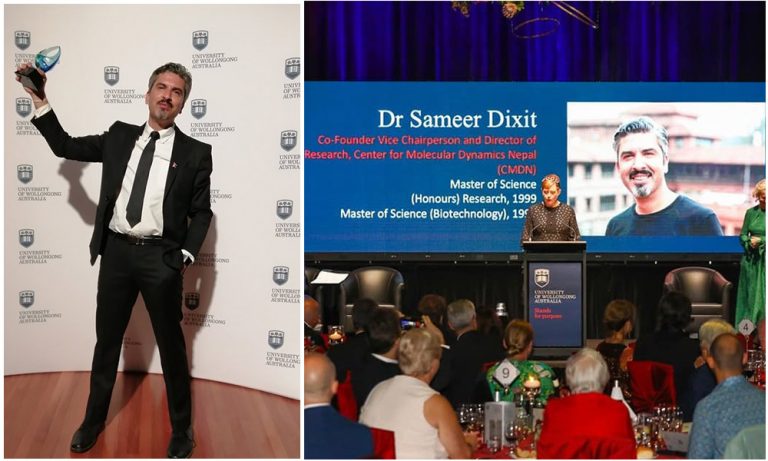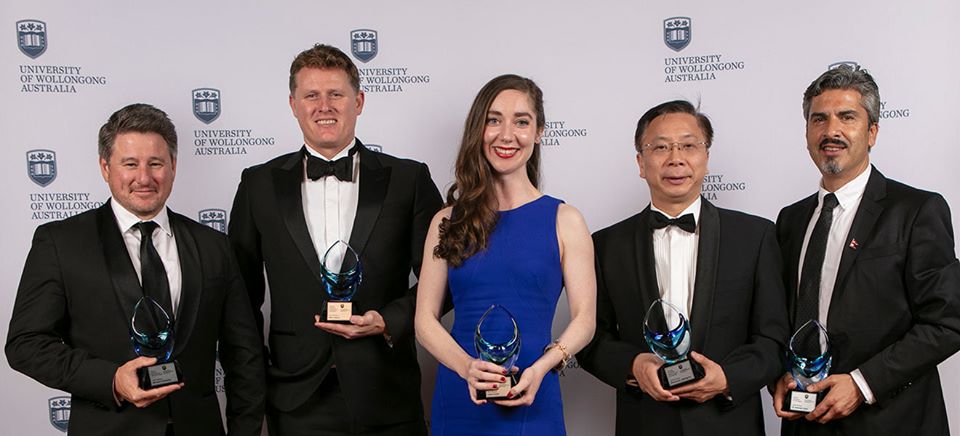
Dr. Sameer Mani Dixit, an infectious disease researcher from Nepal has been awarded the UOW Alumni Award for Social Impact. He, along with other recipients in their respected categories were presented with the award amidst a formal program in the University on November 27.
Dr Dixit has been recognised for his unrelenting efforts towards driving more effective responses to infectious diseases in Nepal and is the nation’s foremost authority on antimicrobial resistance. Dr Dixit co-founded the Center for Molecular Dynamics Nepal (CMDN) in 2007, where he is Vice-Chairperson and Director of Research. The independent not-for-profit research driven organisation is one of the first of its kind in Nepal, pioneering a revolution in research to drive evidence-based policy making and deliver better outcomes for people, animals and the environment. He has worked with the Nepalese Government to identify and contain major epidemics, including providing clear evidence to guide effective response to a deadly bacterial cholera outbreak in Western Nepal.
Today, CMDN has grown from seven full-time staff to more than 70, and more than 200 during multiple projects. In tandem with Intrepid Nepal, CMDN’s commercial laboratory arm, its impact has expanded into a diversity of areas ranging from plant genetics to mass-production of vaccines for viral diseases. It collaborates with governments, the World Health Organization, and leading institutes around the world.
Dr Dixit is behind the development of a thriving health and environmental research community in Nepal. He is an active member of the Nepal Public Health Foundation’s Global Antibiotic Resistance Partnership, advises the Ministry of Health and Population on AMR Policy Development, and is a biotechnology advisor to the Ministry of Science and Technology. He is widely published and the recipient of multiple awards.
A man of many talents, Dr Dixit is also a celebrated producer and actor of both stage and screen. His film Highway was the first Nepalese production to be screened at the Berlin Film Festival, and he recently appeared in a lead role in feature film Na Yeta Na Uta (Neither Here Nor There). Since December 2017, he has cohosted Kantipur Television’s Network’s Good Morning Nepal breakfast show, using the reach and recognition it offers – and his substantial Twitter following – to advance his mission in science, public health and beyond.
“That platform and visibility has helped me secure meetings with ministries and organisations that would otherwise have been difficult to access, and to bring expert guests and beneficial scientific knowledge to the community.”
Also a motivational speaker, an activist for the anti-corruption movement in Nepal, and an avid cyclist campaigning for greater road safety, Dr Dixit rarely sits still. He partly attributes this to a genetic predisposition to multitasking, honed through the years to more effectively syphon into his many avenues of achievement.
“Whatever I’m doing at any given time, I want to do it to the best of my ability, to take it to the next level. I work in minutes, not hours or days; every minute counts.
Dr. Dixit completed his Bachelor of Science (Honours) and Master of Science (Biotechnology) from University of Wollongong.
Every year University of Wollongong honours a selected ex-students who after completing their degree, go forth into the world and work towards making a sustained difference in the future. These awardees, as per University of Wollongong, ‘bring their passion and expertise to advance research, innovation and education, reshape industries and save lives – now and into the future.’

The recipients for 2019 were:
- Mike Sneesby: Alumni Award for Innovation and Entrepreneurship
- Julia Green: Young Alumni Award
- Dr. Sameer M Dixit: Alumni Award for Social Impact
- Paul Harris: Alumni Award for Professional Excellence
- Professor Aibing Yu: Alumni Award for Research and Scholarship





